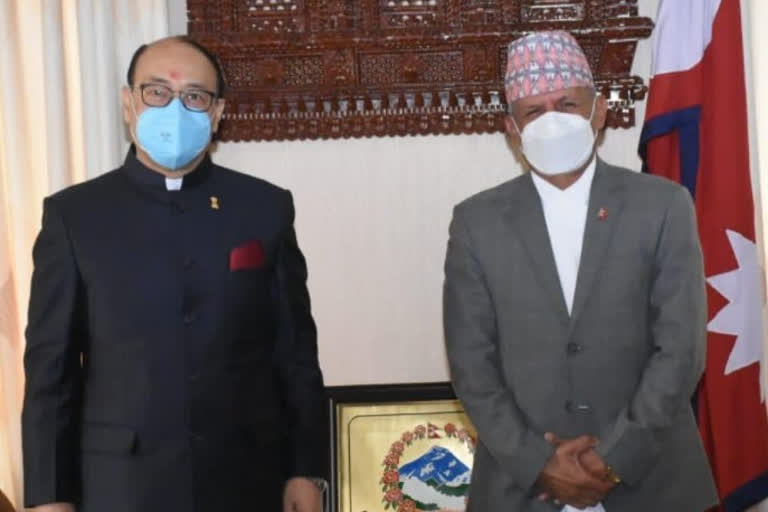New Delhi: Foreign Secretary Harsh Vardhan Shringla's visit to Nepal amid the COVID-19 pandemic suggests a determination to address the bump in the relationship between the two countries, opined an expert on Thursday.
The most recent bump, of course, is the bitter border row over Nepal's claims in the Indian territories of Kalapani, Lipulekh, and Limpiyadhura.
However, what remains to be seen is whether Shringla's visit to Nepal would bring winds of change in the New Delhi-Kathmandu relationship.
An expert opined that the Foreign Secretary's visit to Nepal shows a definitive cooling down of heat between the two countries.
Speaking to ETV Bharat, former ambassador JK Tripathi said, "India's Foreign Secretary's visit to Nepal shows a definitive cooling down of heat between the two countries. The border dispute near Pittoragarh for Kali Nadi, Limpulekh, and Limpiyadhura embittered the relations between the two countries, quickly followed by the border pillar issue by Nepal. As it was told, Nepali customs have put some border pillars in Nepal which said that everyone will have to require incoming permit order or sort of visa. Some Indians were turned back, so these things naturally estranged India and India made an issue out of it."
There was bitter opposition by the senior leaders within the Communist Party of Nepal and also strong opposition by Nepali public and demonstration, reflecting that Nepal should not treat India in such a manner just because the Himalayan country has China's backing. Hence, the Nepali government had to hurry back and issue a statement, followed by another statement by the High Commission of Nepal in Delhi, saying that things will be normalized -- right after that India's Army chief visited Nepal, Tripathi pointed out.
Read: Jaishankar assures Indians in UAE of govt's responsiveness on post-Covid normalcy
The foreign secretary has already visited Maldives, Bangladesh, and Sri Lanka and is in constant touch with Bhutan, and Myanmar which means, within the SAARC countries, India is renewing its relationship with its neighbours except Pakistan, he added.
Tripathi further underlined that the Nepali government also thinks that it is not in its favour to underrate India as the biggest neighbour. The Nepali government has realised that regardless of the Chinese assistance is to Nepal, India is their lifeline for the supply of essential goods like petrol, diesel, gas, and many other products. Being a landlocked country, Nepal also exports through India as it does not have any port.
The other pressing bilateral issue between the two neighbours that needs attention is the closed India-Nepal border. The border runs for over 1,700 kilometres and was closed by both countries in March to contain the pandemic. While India opened the border on October 22, Nepal is yet to do so. Further, flights between the two countries have also not resumed. Though there exists no 'air bubble' between the two nations, Nepal has opened its skies to other countries.
Therefore, it is expected that Shringla's visit to Nepal will perhaps convince the Oli government to re-open its borders and agree to an air bubble.
Commenting on the same, Tripathi said, "Certainly, Shringla's visit will ease out the relations more, especially on issues like closed border and agreeing to an air-bubble. It will rather facilitate an unhindered visit by each other's citizens. About 20-30 years back, no passport or visa or identity was needed to go to Nepal for Indians or vice versa."
Read: India, Bangladesh to discuss transborder crime
"If Nepal closes the border again, how long can it go on? Nepal tried to do so a few years ago, but Madhesis of Indian origin in Nepal opposed it because Nepal Parliament passed a law which was detrimental to Madhesis, that resulted into soured relationship and transportation of goods across the border fully stopped. There was a severe problem in Nepal which was also experienced in the year 1981-91 when the India-Nepal friendship treaty expired and Nepal did not accept to re-negotiate the treaty. But in 1991-92, it was re-negotiated as two separate treaties and everything was resumed. So, Shringla's visit to Nepal will bring some more positive news," the former envoy added.
Pertinently, the India-Bangladesh 'air bubble' was operationalised only after Shringla's discussion in Dhaka. Therefore, it is expected that India's proposal for an 'air bubble' with Kathmandu made in August, could be finalised during Shringla's visit.
Foreign Secretary Shringla who arrived in Nepal on Thursday for his two-day maiden visit, held a bilateral talk with his Nepali counterpart Bharat Raj Paudyal.
During the talk, both the sides agreed on various steps to advance some of the areas of the cooperation and reviewed progress on commitments made by leadership and committed to looking at some other initiatives between the two nations.
Read: India to keep global spotlight on cross-border terror
"We had a very productive and useful exchange; we went through a very large number of issues of bilateral cooperation. It shows the multifaceted and comprehensive nature of our cooperation," FS Harsh V Shringla told the media.
It is pertinent to note that India's Foreign Secretary also handed over COVID-19 medical aid to Foreign Minister of Nepal Pradeep Kumar Gyawali.
Earlier today, the foreign secretary also called on Prime Minister KP Sharma Oli at the latter's residence in Kathmandu.
According to the Ministry of External Affairs, Shringla's visit is in keeping with the tradition of regular high-level exchanges between the two countries and the priority India attaches to its relations with Nepal.
Earlier this month, Indian Army chief General MM Naravane travelled to Nepal on a three-day visit during which he held talks with Nepal's top leadership and discussed bilateral relations.



